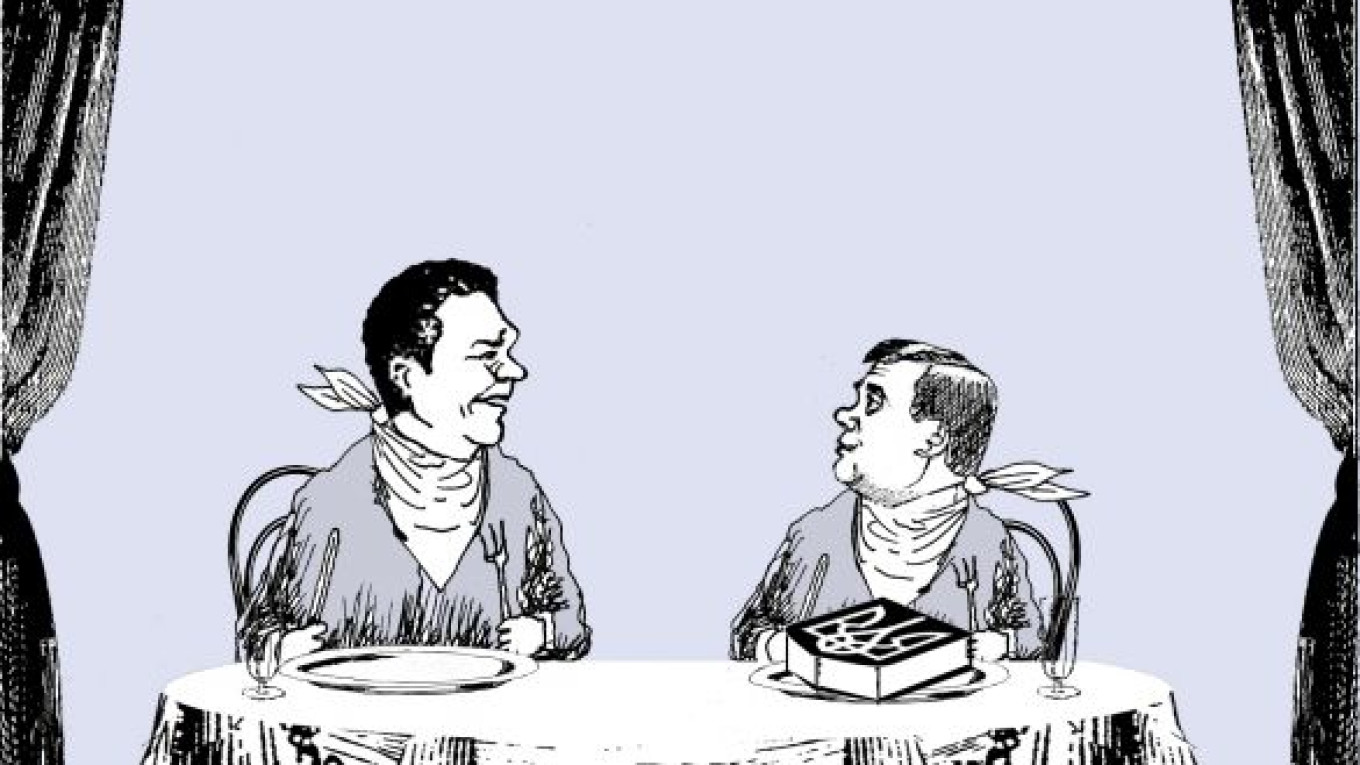President Dmitry Medvedev’s visit to Ukraine this week is a continuation of the weekly meetings between the Russian government and the new leadership in Kiev at either a presidential or prime ministerial level since Ukrainian President Viktor Yanukovych’s election in February. The series of high-level meetings don’t appear to confirm Ukraine’s initial intent to establish a balanced foreign policy between Russia and the West.
After years of political crises and instability in Ukraine, the West greeted Yanukovych with a strong desire to believe his promise of bringing stability and reforms. Ukraine fatigue was replaced by wishful thinking.
Less than 100 days later, though, it should now be abundantly clear to Western governments and international organizations such as NATO and the European Union that neither stability nor reforms are in the cards for Ukraine, and there are five reasons for this:
1. The hope that Ukraine’s oligarchs, who bankrolled Yanukovych’s election campaign, now seek legitimacy as born-again businessmen and are keen to clean up their acts is a myth. Business and politics were tightly linked during Viktor Yushchenko’s presidency, despite his pledge to massive Orange Revolution crowds in 2004, and the umbilical cord between oligarchs and the state has become even closer following Yanukovych’s election. The oligarchs represent a dangerous threat to Ukraine’s young and fragile democracy as seen in growing protests by journalists who are threatened with the return of censorship under oligarch ownership of the media. A free and competitive media was the most important remaining legacy from Ukraine’s democratic breakthrough six years ago.
2. The West and Yanukovych understand stability in different ways. The West sees stability as the desire to reduce political conflict by pursuing national integration and consensus politics, while Yanukovych defines stability as monopolizing political and economic power. An acquiescent press, moot civil society and loyal political opposition represent stability to current Ukrainian leaders.
3. The gas lobby has regained its powerful position in government. Billions of dollars were earned by Ukraine’s gas lobby when the opaque gas intermediary RosUkrEnergo was operating between 2004 and 2008. Corruption in the energy sector has reduced popular trust in Ukraine’s state institutions and undermined the country’s democracy. Politicians tainted by corruption have little popular legitimacy.
4. The Yanukovych administration is seeking to undo the national consensus on a Ukrainian and European identity fashioned by the three previous presidents after independence into something resembling the Eurasianism that has emerged in Russia during the last decade under Vladimir Putin. This radical rewrite of Ukrainian identity will unleash what increasingly could become a violent reaction especially from pro-European young Ukrainians who have never known the Soviet Union.
One mimic of Russia is to rehabilitate Stalin and downplay his crimes against humanity. Yanukovych’s de facto denial of the 1933 famine in Ukraine in a speech to the Council of Europe in Strasbourg on the same day that Ukraine ratified the treaty that extended the lease to Russia’s Black Sea Fleet in Sevastopol poured oil onto a fire. Imagine an Israeli leader denying the Holocaust, and you can understand the reaction from patriotic Ukrainians.
5. Prime Minister Mykola Azarov’s government has no plans to institute painful but highly necessary reforms in Ukraine. The government is a collection of yesterday’s bureaucrats from the corrupt and neo-Soviet era of former President Leonid Kuchma who will be quick to derail IMF-backed economic reforms.
In the three months since Yanukovych’s inauguration, the Kremlin has tried to cut as many deals as it can with the new Ukrainian government. The new Black Sea Fleet lease and the offer for Gazprom to absorb the Ukrainian state energy monopoly Naftogaz are just the beginning of its list of targeted takeovers as we see from the latest announcements.
Western preoccupation with priorities elsewhere in the world encourages Russia to test the limits of national and international tolerance. Russia knows exactly what it wants from Ukraine, but it seems that the West has failed to develop a clear strategy for partnership with Ukraine.
A nation of 46 million people at the heart of Europe has been left adrift to fend for itself. The Orange Revolution was a huge missed opportunity for both Ukrainians and the West to expand democracy and markets to the eastern fringe of Europe. By all indications, Russia is making sure that it doesn’t miss the next opportunity in Ukraine.
Edward Chow is a senior fellow at the Center for Strategic and International Studies in Washington, and Taras Kuzio is senior fellow for Ukrainian studies at the University of Toronto.
A Message from The Moscow Times:
Dear readers,
We are facing unprecedented challenges. Russia's Prosecutor General's Office has designated The Moscow Times as an "undesirable" organization, criminalizing our work and putting our staff at risk of prosecution. This follows our earlier unjust labeling as a "foreign agent."
These actions are direct attempts to silence independent journalism in Russia. The authorities claim our work "discredits the decisions of the Russian leadership." We see things differently: we strive to provide accurate, unbiased reporting on Russia.
We, the journalists of The Moscow Times, refuse to be silenced. But to continue our work, we need your help.
Your support, no matter how small, makes a world of difference. If you can, please support us monthly starting from just $2. It's quick to set up, and every contribution makes a significant impact.
By supporting The Moscow Times, you're defending open, independent journalism in the face of repression. Thank you for standing with us.
Remind me later.


